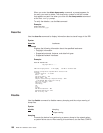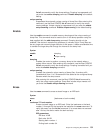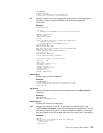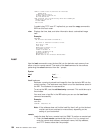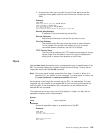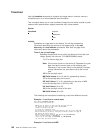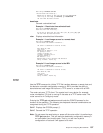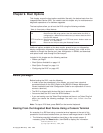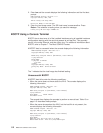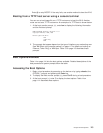
Syntax:
tftp
get
put
get
CONFIG address-remote-server path/filename
Initiates a request to a TFTP server to transfer a file
from
the server
to
the
device. The server sends a data packet and the client node acknowledges
receipt of the data. This cycle continues until the transfer is complete and
the following message appears on the console: TFTP transfer complete,
Status: OK
If the TFTP transfer is unsuccessful, a detailed error message appear on
the screen. While transferring a file to CONFIG, the following message
appears on the console: Updating Config: Do Not Interrupt
If you are attempting to transfer a file to IBD, and there is not enough
memory in the IBD, the following message appears on the console:
No Free IBD BankAttention: Do not reset or power off the router while
updating of the configuration memory is in progress. This may corrupt the
data in configuration memory, forcing you to reconfigure the router.
Example:
tftp get
local filename [CONFIG]?
remote host [0.0.0.0]? 128.185.163.1
host filename [0A019947.cfg]? configs/vl-28.cfg
TFTP transfer complete, status: OK
Local filename
Specifies the name that you want the file to appear under after it
has been transferred to the local device. When entering the
filename, make sure that you specify the complete pathname if you
are transferring the file to the IBD. The default is CONFIG.
Remote Host
Specifies the address of the host containing the file you want to
transfer. The Magic Number stored in the file is compared to the
number in static RAM. This prevents cross loading nonvolatile
memories between types of devices.
Host filename
Specifies the name of the file on the host that you want to transfer.
Make sure that you specify the complete pathname. The default is
the ASCII representation of one of the host’s IP addresses in
hexadecimal. This ensures that the file has a unique name.
The hostname must match the hostname in the archive file. The
hostname is case-sensitive.
put
CONFIG address-remote-server path/filename
Initiates a request to a TFTP server to transfer a file
to
the server
from
the
router. The server acknowledges the request and the client transfers the
file. This cycle continues until the transfer is complete and the console
displays the following message:
TFTP transfer complete, Status: OK
Note: The TFTP put command does not allow you to place a file in
another device’s configuration memory or IBD. You must be logged
into that device and use the TFTP get command.
108 MRS V3.2 Software User’s Guide



